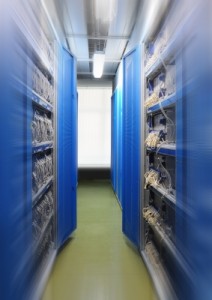It seems like “the cloud” has been the hottest IT & tech phrase over the past few years when it comes to services. And that’s understandable – cloud services have allowed companies to expand their needs quickly and often times inexpensively.
To break it down to it’s most basic level, using services “in the cloud” simply means that a company (or end user) is accessing services or data hosted somewhere else. For example, in the not too distant past companies that wanted the features and functionality of Microsoft Exchange needed to pay for (and maintain) an Exchange server on their local network. Now, Hosted Exchange provides all of those features without the overhead and problems that come with local server maintenance.
 There are still some companies that prefer not to host their services in the cloud however. Sometimes there are regulatory issues such as HIPAA and Sarbanes-Oxley that prevent companies from hosting data on servers they don’t physically have access to or maintain directly. In some instances, companies simply feel safer when they know they have full control over the hardware that their data is stored on.
There are still some companies that prefer not to host their services in the cloud however. Sometimes there are regulatory issues such as HIPAA and Sarbanes-Oxley that prevent companies from hosting data on servers they don’t physically have access to or maintain directly. In some instances, companies simply feel safer when they know they have full control over the hardware that their data is stored on.
For those companies that prefer to have full control over their hardware and environment, hosting their servers in a data center is the perfect option, as it allows them to create their own private cloud for their employees and clients to access. To illustrate, here are three primary reasons companies will benefit from colocating in a data center.
Power Redundancy – Data centers will very often feature onsite backup generators in the event of power loss in addition to offering UPS units to their customers for immediate short term power continuation. Location is also a key factor for data centers as well; many are located in areas with an extremely strong and reliable power grid. Our data center in the Foundry complex in Providence, RI is a great example of this – our data center is on the same power grid as many of the downtown hospitals as well as the Providence Place Mall, which helps provide extremely reliable power to our clients.
Multiple Bandwidth Connections – Servers housed locally in a company’s office are usually tied into the Internet connection that’s also used by the employees for day to day Internet surfing and tasks. Not only can this cause congestion when outside users or clients are accessing the in-house servers, if there’s a problem with the Internet connection itself it will affect the uptime of those servers. Having multiple Internet bandwidth backbone providers into a data center helps to not only alleviate congestion and performance issues, it also helps to improve overall uptime in the event of a carrier problem. Providing as much redundancy into your cloud is critical to maintaining uptime for your data and users.
Upgrading Easily – When you control all of the hardware your data is stored on, you know that you have full control over the performance you will need to deliver that data. If and when your hardware needs to be upgraded, swapping out hard drives, adding RAM, or even installing a new appliance will provide guaranteed results because YOU are the one providing that hardware. There are no concerns over whether or not the platform your data is on is out of date, or if the hardware has been used and abused. YOU have full control over how your data is being backed up, and there’s no reliance on someone else’s word that it’s being done. For many clients, this aspect of setting up a private cloud is the primary reason they opt to place their servers in a data center.
Hosting your data and services in the cloud is a highly productive and lower cost way to provide services to both your employees and clients, and creating your own private cloud goes one step further (ok… more than a few steps further!) to ensuring your data and infrastructure are well taken care of. Colocating your servers in a data center to create that private cloud will reduce your operating expenses in addition to providing better performance.
If your company still maintains a number of servers onsite, consider building your own private cloud, and keep full 100% control over your data and the hardware it resides on.
